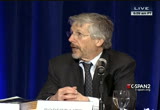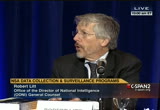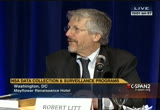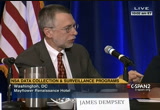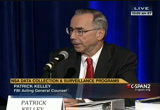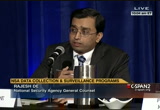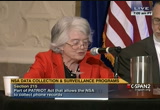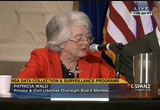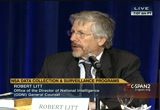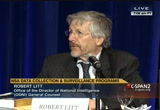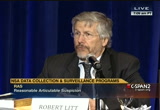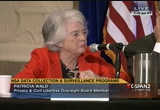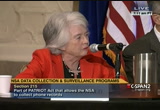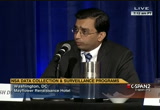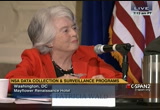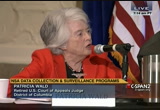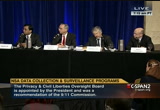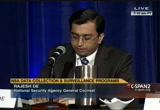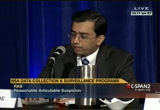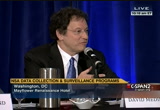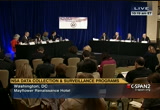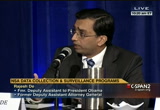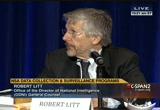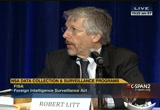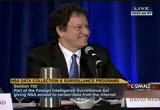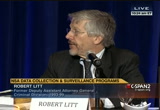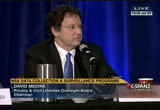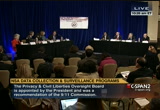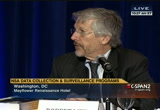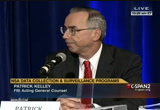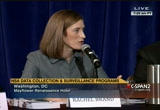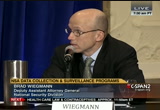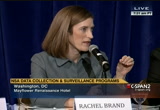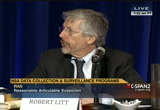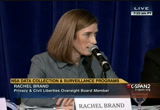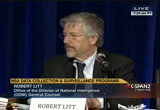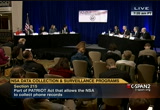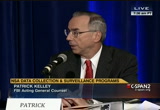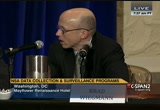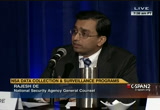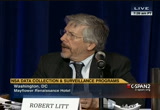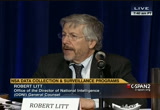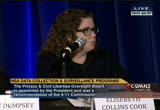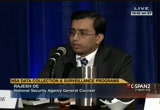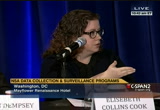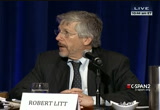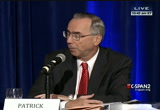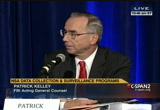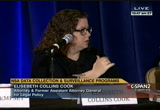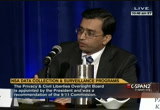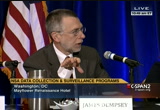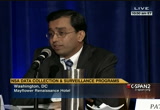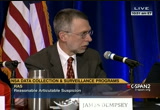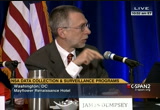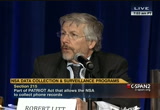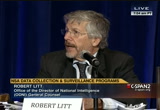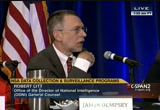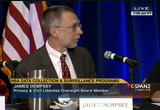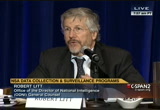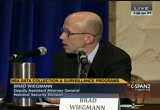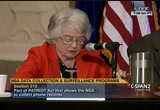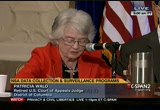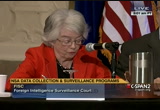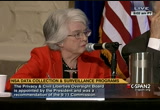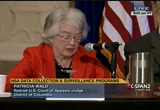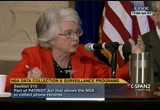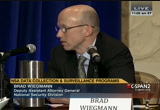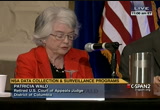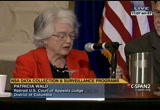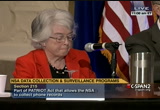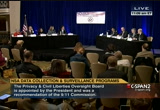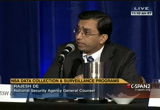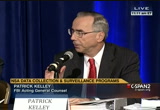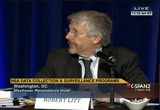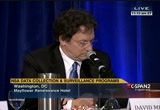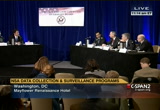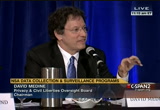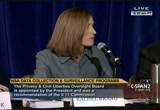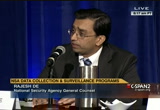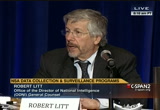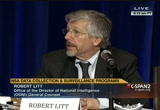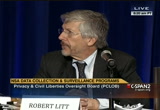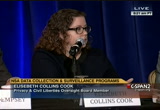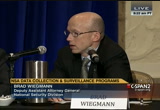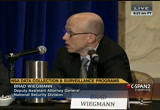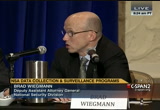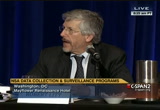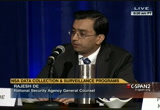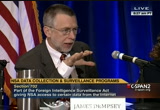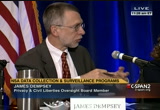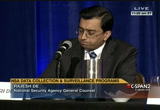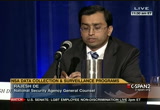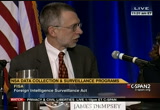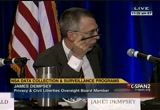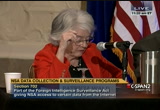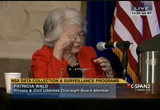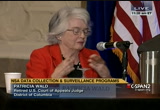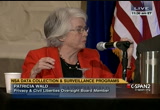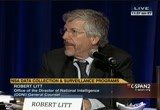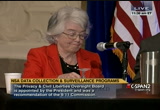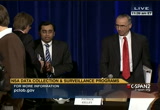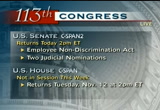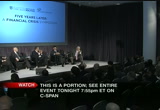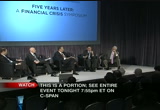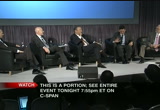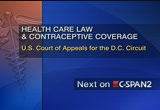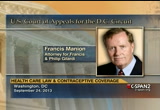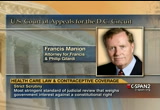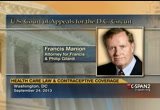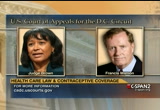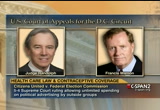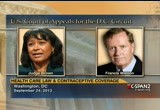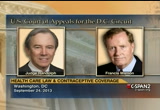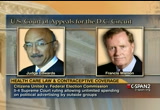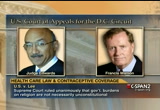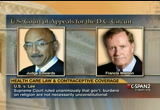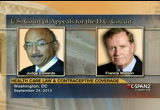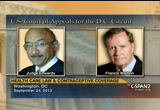tv Key Capitol Hill Hearings CSPAN November 4, 2013 10:00am-12:01pm EST
10:00 am
investigation requires independent legal justice, and in particular if there is any desire to intercept any buddy's communications, any americans communications that requires a judicial warrant based on probable cause. the third difference i think is the degree of oversight. as was mentioned before, to my knowledge and generally speaking, there is no systematic oversight by prosecutors and or inspector general's or other side of the day to day determinations that lead to terrorist stops by police. that's one of the reasons there is the litigation in new york. as raj said at some length, there is a systematic oversight here. so, i think that all of those determinations make this a considerably lesser intrusion than the police terry stop. in terms of the possibility of
10:01 am
an alternate standard, obviously there are a number of alternate standards that can be applied. but the important thing to remember is that this program is a discovery program. the whole idea of the program is to identify avenues that warrant investigation into rollout avenues that do not warrant investigation. and the more that you require -- of the more that you add on to the standard that is required before you can even investigate less useful tool becomes. for example, if you talk about reason to believe the number me lead to contact in the united states, that is exactly what we are trying to find out here. we have got a number. if we have a terrorist phone number, what exactly we are trying to find out is do we have information to think that this may lead to the drooping investigation in the united states? >> one quick thing, raj, if i
10:02 am
could. on the question of follow-up, there is a very close review of the ras determination itself. what is your review of how the fbi uses the information that is generated? >> we use the information as it was indicated to further our investigative efforts so we can open up on their investigation perhaps, or we can open up an investigation. but it's the sort of review process to go and look at what was the outcome, how was it used, how do we come from or not confront an individual to the tracing all the way down to the street or to the fbi follow-up
10:03 am
investigation. what sort of assessment or tracking is there on that? >> i think what you are referring to is the oversight and compliance efforts we have both internal and external up to and through congress as well as the department of justice, department of justice inspector general, department of justice routinely reviews and audits internally from the street level, for example, the investigative cases that we have by preview for supervisors every 90 days to see what the status is. in addition to that, the fbi has an office of compliance where we are continuously looking at the risks that we will execute in our mission not to follow the letter of the law. so through all of those internal and external systems of oversight, we are continuously
10:04 am
reviewing the way that we conduct our business. >> just to put five points on the class received because i think at nsa we are really worried about conflation of the public record. so what, using the terry stop standard means, the comparison to stop and rest. that would mean a police officer write down the reason for a stop and frisk as we do for the telephone metadata. only one of 22 supervisors approve the stopped and frisked before it would happen. and in our case, the data is all anonymous as opposed to the stop and frisk the point in front of you. the stop and frisk standard we have post in query audits every 90 days, as when a police department audits every 90 days
10:05 am
what happens. and we also report to court every 30 days and get it free authorized every 90 days. so while yes, in a legal sense, the legal standard in the lives from the terry stop standard i think just those factors alone distinguished the use of that standard in this context and clearly evidence that the far, far more regulated and rigorous process than is feasible in the search context. >> thank you. i'm going to open with kind of a general question. since the revelation of the 215 program, which wasn't secret program before, they're had been as you well know a plethora of suggested reforms or suggested changes etc.. i'm interested in whether or not you think any of these suggested reforms that you are aware of
10:06 am
deserve not just serious consideration, but perhaps adoption. let me give you sort of an example. it was a secret program. it is now no longer the fact of the program. and many of its operational details that the government enter has revealed are no longer secret. i assume from the fact you are here today and from many of your answers that you think the program deserves to be continued. so there are two parts to my question. one is whether or not there are any reforms suggested by various people that you think are worthy of consideration. or number two, do you think the fact that you want the program to continue could cast some doubt on the need for secrecy of the fact program to begin with, which of course is one of the big questions being debated whether or not when you have
10:07 am
able collection program of any kind that the fact is a lot of citizens, a lot of residences. the fact of that program is and all of the details of its operation that deserve to be debated publicly in converse and known to the public. it's kind of a double beryl question. >> i would like to take a crack at that first a heavy personal favor to ask and that is if jim dempsey could turn a little bit because the flood light is shining -- thank you very much. [laughter] i'm getting blinded. so to answer your second question first about secrecy, i don't think you can draw from the fact that we want the program to continue the conclusion that the program should never have been secret. there are many intelligence
10:08 am
programs that operate more effectively when they are not known because disclosure of what we obtain and how we obtain it can enable a hour adversaries to avoid or take steps to avoid what we are doing. that said, that doesn't mean that once they become disclosed, they are entirely ineffective. there is no question in my mind that this program is at least potentially less useful now than it would have been before the disclosure. whether it is actually less useful or not is going to take time to determine. but, you know, going forward obviously we have declassified and released the last two quarters of the fisa court and we are under the president's direction in a more forward leaning mode with respect to transparency. but we still come as a sort of
10:09 am
custodian of the intelligence apparatus that protect the nation, we still have to be sensitive all the time to the fact that disclosures do risk compromising our capability. with respect to your first question, i think that we have repeatedly said that we are open to consideration of a variety of possible reforms to the program so long as they don't eliminate its utility. we have talked about shorter retention periods and possible limitation on the number of hops that we can make queries of and the process after the fact of review of the ras determinations by the fat. we've talked about providing greater transparency to the manner and extent to which the program is used. all of these are subject again to the qualification that we don't want to impose such restrictions that they would be eliminate the utility of the program and we do not want to
10:10 am
impose on ourselves burdens that we cannot meet. some of the transparency proposals are things we simply cannot do with any reasonable effectiveness. >> but, to follow up a little bit on that, they're have been articles recently in the paper come and i think that they contain some polls suggesting that there is widespread public distrust in the nsa as a result of many of the revelations over the last several weeks. do you think that there is some need for whatever you want to call it, remedial affect making changes in some more types of public disclosure? for one, you suggested that there may be. but one area that is covered in some of the bills in congress is the need for a more i think the word is more secure foundation
10:11 am
of the 215 program, and then specific legislation. i know it's been reauthorize, but in a specific legislative acknowledgment of that program. there has certainly been a fair amount of confusion and some criticism of the fact that if you lead to 15, the public records bill on its face, you don't get much notion that this might be involved etc. and so, as you know some of the efforts have said to put it on a sound specific legislative basis that everybody knows what you're going to do if there is such a program, etc., and what are your feelings to that? >> can i speak to the first point, judge -- as a general counsel for nsa my first duty is to make sure that our duties are
10:12 am
lawful but i view my role and of the senior officials at the nsa to ensure to the extent possible given the nature of our work the public legitimacy of what our agency does. there's no doubt that is an important factor. that being said, i think this particular program count historic we all of the industry share of institutional legitimacy that one could expect given the current set up of the fisk oversight that we have. so -- fisc oversight that we have. not only was this program approved by the foreign intelligence court every 90 days but it was twice approved, the particular provision was twice reauthorize by congress with full information from the executive branch about the use of the provision. now, as to whether that should be codified separately or not, i think as a confidence-building
10:13 am
measure, for all intensive purposes i think that the the date that we are having now affect rates the public legitimacy aspect of the program and we will see how it plays out and how the reform measures are taken. but i don't think a separate codification is necessary. but the point is well taken that public confidence needs to be ensured and i would only suggest to the extent public confidence is shaken in part that is as a result of historical secrecy, and in part it's a result of a large amount of misinformation and confused public debate and it's hard to separate the two. they are intermingled of course, and so i think it is the former that is certainly the necessary for a space institution to continue. >> i just want to have one very brief comment to raj's in terms of the extent to which the congress is kept informed. why commerce we are required to
10:14 am
provide significant opinions and decisions of the fisc for the judiciary committees in both houses of congress and they got the materials relating to this program as we were required to bye law. >> last question. if there were another metadata program to come along based on your experience with all that's happened with 215, do you think would be desirable, or undesirable for it to become a matter of public knowledge and open discussions in congress? not the details of the program, but if there was to be able program that would affect a large amount of the citizenry? >> that depends upon the nature of the program.
10:15 am
i think if the nature can be disclosed without compromising intelligence sources and methods, then that is something that would be considered. but the public discussion is going to lead to a considerable disclosure of sources and methods, i don't see how we can do that. this is why the intelligence committee of congress are set up and we are required to notify the intelligence and judiciary committee of things that we do because they essentials and stand as the proxy for the people in overseeing sensitive intelligence programs. >> the oversight of the program as i understand it there is judicial approval of the program itself but there is not a judicial approval of the selection of the particular phone number, the ras determination or the suspicion even before or after words
10:16 am
apprised of what has been chosen so the court can evaluate with the program is operating consistent with the authorization to the program itself. what is the practical circumstances where there was an urgent need to pursue a particular phone number perhaps after the fact reporting would be practical with that exception for the court to approve the ras determination in advance or to review the ras determinations as a part of the 90 day review process and approval process to make sure the program is operating as quick and expected. >> we are open to increased role in the system. and the nsa in particular and other agencies feel the same. i would make a couple of points. one, i think among the criteria necessary to maintain the usefulness of the program, you heard a variety of things.
10:17 am
we tend to summarize them and sort of for the major bucket's one is beginning privacy protections that we hit on earlier and one is to comprehensiveness of the data and the debt to keep it and operational getting to the question you just raised. it will be difficult and not practical to preserve the appreciable program to have the entire approval for any determination but i think that you have raised a very valuable point that we currently have reporting requirements on fisc and we report every 30 days in fact even though the program is often buys every 90 days. succumbed at 30 david hinkle could well be a useful -- could well be a determination for the fisc for the documented determinations made today. i just note that those determinations and brad mentioned earlier are reviewed by the department but to the extent that it builds public confidence i think that it would be of no concern of the nsa to
10:18 am
have the fisc review those after the fact. >> one concern that we have actually talked about on our own terms of discussions with the idea that you articulated with emergency exception given the nature of the program is such that we are frequently operating an exigent circumstances we would be uncomfortable with a scheme that set up the essential blease follows the statutory rules. >> the court indicated publicly that it has to assess compliance with its own orders. but if there is a mechanism every 30 days to report back on the ras determination is made so it wouldn't interfere with operational concerns would give the chance to say if you are exceeding the courts expectations of the foundation of your squarely within what the court expect you to do. >> that is something to open.
10:19 am
it depends what exactly the proposal is put in concept that is something that we would be comfortable with. >> we have to keep in mind of the burden of the court as well. but for the reasons that raj and bob reviewed something worth considering. >> to shift to the program briefly which is the electronic communications service provider program. as we know in the last couple weeks there has been a lot of concern by the non-u.s. persons, foreign citizens about being subject to surveillance. what are your thoughts about whether this program essentially is designed to focus on the rights of u.s. persons being surveiled and the court approval for u.s. citizen surveillance what do you think about extending a degree of protection to them on u.s. persons whose communications are being reviewed pursuant to the 702
10:20 am
program? >> just as a general matter, number one, there is for the collection of the process in place and the agency process to determine that for which we conduct foreign intelligence generally. so i would like to make sure folks don't have the misimpression that intelligence gathering is a and not directed in the first instance putting a second come all collection has to be authorized in the purpose that includes the 12333 collection and pursuant to certain certifications that are submitted to the court for the particular for intelligence purposes. the third point that i would make is even though we have a number of protections in place for u.s. persons information, beneficiaries of that also are foreign nationals to meet the subject of investigation. so in other words, the retention limits and others that are currently in place in fact served as protections for any
10:21 am
subject of intelligence collection. and fourth, i know the dni is currently considering whether we want to document for the protections for them on u.s. persons beyond those that are articulated today. >> if i can just follow on, there is a good reason why not only the united states but most agents provide a greater degree of protection for their own citizens and nationals and others with respect to intelligence activities starkly. the great fear of the agency has been not like the example everybody always gives that the power will be directed inappropriately to words repression of their own citizenry. i think that is why his or a plea in this country we have a greater degree of protection for u.s. persons but as raj says, that doesn't mean there are no protections for other persons. in that regard i think it is worth noting fall/winter that
10:22 am
the nsa inspector general sent to i believe it was senator grassley which identified a dozen or so instances in which they determine the the nsa had inappropriately used the collection of authority. first of all they were all under the executive order 12333. none of them are under fisa. there's never been a finding of willful violation of fisa. but even in this case, the majority were improper inquiries of information about the non-u.s. persons. and so, it is not only the fact that we have rules, but those rules are actually enforced. people were disciplined or resigned from the nsa. i would reiterate what raj said which is that we are open to
10:23 am
considering whether there is some value in formalizing and making more public the rules that we do have for protecting personal the information about non-u.s. persons. >> returning to the protection for u.s. persons, as i understand in the 702 program when you target a non-u.s. person overseas ev kaptur communications where a u.s. person in the united states is on the other end of the communication. would you be open to a warrant requirement for researching the data when your focus is on the u.s. person on the theory they would be entitled to the fourth amendment rights about that u.s. person? >> this obviously is beyond nsa as well.
10:24 am
that is unusual and extraordinary steps to take with respect to information that has been inquired. i started out as a prosecutor and there were all sorts of circumstances which information is up acquired that relates to persons that are not the subject of investigation. you can be overheard on the title three why your tap or fisa wiretap. there me be information on you. the general rule on the premise has been information that is lawfully acquired can be used by the government and a proper exercise of authority. we have rules that limit our ability to collect, maintain and disseminate information about persons. those rules as you know are fairly detailed but generally speaking we can't do that except for foreign intelligence purposes or when there is
10:25 am
evidence of the crime and so on and so forth but what we can't do under section 702 is go out and use the collection authority to get information for the purpose of getting information about u.s. persons. once we have that information i don't think that it makes sense to say a year later if something comes up, we need to go back and get a warrant to research that information. >> under 702 as i understand you can collect information about the target rather than to or from the target and some concerns have been raised about the breadth of that. what impact would that be to the targeting communications about this person of interest? >> let me make a couple of general points. one about the collection just speaking of the most general level is helpful from a
10:26 am
discovery standpoint and it's hard to show how that collection is useful but it has uses beyond that of to or from collection. i would say a couple points in terms of the privacy collections, the data that comes in in that way and it's hard to get more specific is treated differently than the other data and it has a shorter retention period so there are procedures in place that are intended to account for the greater privacy impact of the question, and those procedures have been approved by the fifth. >> are we expecting three rounds just so we can plan -- do we have time for three rounds? >> we have time for a short round afterwards. >> i want to follow-up on a couple of things that have been
10:27 am
raised. you said that there were certain responses about what proposals the administration could accept. you said there were certain transparency proposals we just couldn't do. which ones were those? >> well, in the absence of the interagency approval on the administration of any particular proposal i do think that proposals for example but require us to count things that we ought now counter that might be difficult to count present problems for us. for example, i don't know if there is such a proposal but if there were a proposal to tell us the number of u.s. persons of telephone numbers that have been acquired a 390 days pursuant, that might be a very difficult thing to accomplish because we don't go out and count that. things that impose substantial burdens might be the kind of thing that would present profits
10:28 am
and a mine not speaking with respect to any specific proposal, but that is the kind of consideration that we would take into account. >> not addressing any specific proposal, but if we were required to a particular service provider carrier, telecommunication provider to disclose a number of orders that were served on them, devotee of the adversary is a very good indicator depending on the relative numbers whether to use that service provider or not use that service providers. the adversaries are listening just as we all are to this discussion. so that kind of specificity is very, very difficult for us to accept. >> if i may add to that, one thing the panel is aware of, the dni has a protective transparency measure that is an annual report and the number of
10:29 am
orders issued under the members of the proviso. what you see is the executive branch chongging to the extent possible to take the productive step towards transparency that can be taken the operational effectiveness and so that report delineates the number of words and target's affected for the orders that are based on the promise of probable cause and the orders under section 215, orders under section 702 of fisa. >> i want to come back to the fifth context if i have time but i want to follow on the discussion of the returned requirement on ras and fisc. that sounds like a good idea why not really clear on what exactly it would add in a practical reality. what exactly what the court do with it? i presume on the way that would work is on a regular basis, for example you would provide the list of ras selectors to the court along with some documentation i would be
10:30 am
interested to hear the documentation would be and what with the court to do with that information? senate i will refer to brad on that, but the documentation itself, we keep the documentation of the factual basis that established the predicate in the first place. so at least from the nsa perspective we keep the documentation and it wouldn't be a great burden to provide it to another oversight mechanism fisc handle that and i would refer to brad. >> one option would be found in the compliance problems on its own. then it could call when the government and say -- >> i think there's something wrong with brad's microphone. >> is this matter?
10:31 am
>> it could function much like the justice department identifies problems with ras determinations. we report goes to the court and the court information could be purged. the court could respond if we had an incident in an order of relief to suspend the operation of the order and suspend the program and take whatever remedial steps they thought were appropriate in order to enforce the requirements of the order. so this could be the same mechanism although the justice department wouldn't necessarily be the intermediary in between and rewarding the compliance then the court could on its own independently review the ras determination. >> that's what i'm getting at. pimex -- i'm not asking but with a compliance problem with the be looking at every ras selector and assessing whether the evidence justifies the determination or what?
10:32 am
>> i think it's important to remember that the last year there were 288 ras selectors. so we are not talking about thousands and thousands, but somebody i think it was the chairman that may have mentioned the idea of having some sort of outside assessment of our we applying the ras standard appropriately and it seems to me that a judge code in the same way that judges litigate and review, was this information sufficient to the particular will suspicion -- articulable suspicion the judge could look at the document and say are you setting the line in the right place? are these people understanding in fact with the ras standard is and playing it correct and if
10:33 am
the judge felt they were either setting too high a standard or too low the judge could provide that feedback along with what ever the congress seemed it was appropriate. >> tell me if we need to talk about this in a different setting. but in the analogous return requirement in section 105 from a lawyer -- wiretap is that with the court does with it under that provision? >> i would have to get back i don't know the answer to that. if you would get back to me that would be great. that's something i've been wondering about. i want to ask about the provision in the way leahy standard that would change. first of a doubt the word material, relevant and material to busbee fisa investigation and limit to being used for seeking information that maintains a foreign power activity suspected
10:34 am
agent under investigation or someone in context that is not a suspected agent of a foreign power. you may not have an official on the provision yet but i would like to ask about it any way and answer to the extent that you can. first of all what do the words end of material that? what would the court to do with that? >> i would have the same question as i read the bill over the weekend by not sure what the intent is. i think that you would have to ask the chairman. the obvious intent i think it is no secret that the sponsors of the bill want to eliminate the program and the intent of the language they are proposing is to prevent. >> given the sense of what evidence you've established the material different from what establishes relevance.
10:35 am
any idea? >> i'm not sure how it would be different. >> can you address the other limitations for the categories of information that would be allowed and how about what impact the investigations since this would no longer be like the current 215 which is a general subpoena authority under fisa. >> the purpose of this pertained language i believe the intent is to try to ensure that the increase in the record can only be obtained with respect to identify individuals. i think that is what their intention is here. and they previously discussed that essentially shut down the program. >> how will that affect the individual run-of-the-mill to 15. is it your opinion it affects only the book collection for the everyday to 15 application? >> from our perspective, the
10:36 am
proposal is flawed in the assumption we know of the person that we are after and that is the essence of the terrorism prevention. we don't know who we are after. so, if we are limited to seeking numbers from the unknown, we are not going to be very effective. again it bares repeating that we are connecting the dots, so that you were dots we have, the fewer connections we will make. so why don't think that model works. i think given the type of data that we are talking about that is susceptible to analytical connectivity unlike other types of business records, then we need large volumes of that data in order to make those connections. so whether we are changing the standard of relevance to relevant and material or saying that there must be a connection
10:37 am
to someone that is known, you are reducing the amount of data that is available and therefore making it much more difficult to make the connections that we need to make. >> just to add to that i think it is important to recognize those changes would apply not only to the bulk collection but the regular 215 orders because this has already been used in the bulk context the predominant use is to maintain individual records in a more targeted way and this would easily change the standard closer to the patriot act standard rather than the broader relevant standard that gives more of the flexibility that pat was talking about in your ordinary case or let's say you want to get hotel records or a car rental record or whatever that might be relevant to your investigation. he would have to meet that high year showing to get those records on the targeted investigation to have a collateral impact on a regular 215 orders that have nothing to do with the current subject of
10:38 am
controversy. >> going back to what you're talking about in the administration disclosing in terms of the types of i think you said target's, which i and stand electronic surveillance where it talks about the target of surveillance. what does that mean for section section 215? >> right now the dni is leading a process to figure out how we best articulate that language in a way that is meaningful to the public because obviously in the context of 215 we have one or that involves quite a significant amount of records we want to make sure we provide some information that's useful and in fact transparent in some way. the same sort of analysis is happening now with respect to section 702 as well. what is the best means to provide insight into the orders and target's affected but at the same time preserve the national security needs under way in the
10:39 am
dni. >> there's been a lot of discussion about the ability of the private sector. i will call them partners and their ability to disclose on a company by company basis their cooperation with the government. do you think that there are proposals out there that would allow a company by company disclosures that would be advisable or feasible? >> this is a matter that is currently in litigation as you know there are papers that have been filed articulating positions of the companies and of the government. >> putting aside whether it is permissible under the current regime whether there could be a current statutory regime that would be advisable or feasible. >> i think the point is the proposal that we articulate it would be on the one hand a
10:40 am
government wide -- on the one hand on the government basis how often there is the authority to use and number two on a company by company basis how long they are turning over information about their subscribers to the government. where we start to have a problem as pat said when you allow the companies to break down on an authority by authority basis with the are providing because the starts to give a lot more granularity about the key devotees are against particular platforms given the kinds of authority that we are exercising. if all of a sudden the company that has not had a large number of title one of a sudden has a spy in title i fisa that is something that is good to be noticed by their adversaries
10:41 am
that will lead them to shift away. on the view of public transparency, what's important to the subscriber is how often does the government going to get my information, and from our perspective how rarely happens to the number of votes for all subscribers, the number of subscribers, the percentage whose information is provided to the government is a minuscule action even when you take into account the government authorities. the overriding concern we have is not having this information broken down on a level of detail that would enable people to avoid surveillance. >> so, following up on a couple of questions that came up in the last round, there are now a fair amount of proposals and discussions about alternative means for accomplishing this section to -- 215 program.
10:42 am
my question is how often do you assess the alternative means during the course of the program? so absent the public disclosure and absent the need to opine on legislative proposals, how often argue internally considering ways to do programs through means that might risk fewer privacy concerns? >> let me speak first to that. it is a very valid and feasible question of the intelligence community general lee and the nsa in particular as to how often programs are evaluated. and what sort of rigorous schedule does that have. as i mentioned earlier, there are some natural points that happens whether it is in the context of the renewal of authorities or the context of congressional reauthorization for in the context of budget decisions that need to be made.
10:43 am
and frankly it happens every day in the context of the assessments. as to whether there should be more focused process for periodic evaluations of assessment over of the reporting requirements i think that is something that we should all be thinking about. >> following up on something todd had asked earlier and one of the themes he was heading, do you think that this discussion today and the amount that is currently publicly available about the section 215 program is predictive of our ability to have a similar conversation about other programs, whether they are current or future? and that is probably too brad or brad. >> i'm not sure i anderson and the question. >> we have heard the fact we are having this hearing is the fact
10:44 am
the government's legal rationale has been made public and that certain fisc ordershis type utrr future. do you think that is logical or correct? >> i can start by recounting the story that may or may not be possible what he thought about the french revolution and his answer was it's too soon to tell. and i think that is very true here. it's too soon to tell really what the effect of the disclosures are going to be. in the intelligence community, we are always looking at risks. what's the risk that comes in the public is going to be damaged. it is irrefutably true that if
10:45 am
10:46 am
it's our fbi but it is a better fbi as well. it's important for us, therefore, to be sure that we understand what, where the lines are. we want to go right up to the line but we don't want to cross the line. so the debate is hopeful that its same time as bob indicated, we have a process in place for that debate. all three branches of government have looked at the 215 program and said it was okay. it took an unauthorized disclosure to bring about fisc discussion and we don't fear the discussion. we think that the american public is somebody we would like to have a discussion about. but it's the adversaries we are concerned about. because for every disclosure that the public has, american public as, our adversaries have it as well. so if we can stick with any established channel to have that discussion to protect the things that need to be, then i think institutionally and visually we are better off. >> i think to your question
10:47 am
though, we are having fisc debate and discussion today, does that mean that the program never should've been classified? clearly that's not true. for the reasons bob articulate. we don't know the harm happening today, but given that the disclosure happened and the harms that will be effectuated, are being effectuated, i think what you're seeing is trying to be transparent. to the point i think it's certainly possible to think that greater public discourse about intelligence matters is a good thing, without thinking that it took an illegal act to disclose lawful programs in and of itself was a good thing spent one final question, therefore, for you. you refer to the minimization procedures and their traditionally dissemination use. can you give an example of a collection minimization requirement? i think that's something, you know, you look to the typical
10:48 am
title iii contact and traditionally focuses, when you hurt someone who wasn't the target and took the headphones off. and how that translates into the national security context. >> let me try to address it and hold it more of a general sense and perhaps in a classified setting, getting into more technical details. i think year we are talking about where collection is directed, how collection is directed, the technical means by which its effectuated. the are a range of mechanisms included to minimize -- to the extent possible, minimize on the front and as much as useful given the national security imperative under the collection in the first place. and then we take, as you alluded to we take no steps or the steps possible at every stage in the process not just collection but during use of information, analysis, dissemination and retention of information. >> if i could just add another
10:49 am
sort of conceptual type of minimization procedures at the collection and in fisc regard is that in a number of areas that are hiding requirements of approval and legal review before collection to me undertaken against u.s. persons. >> thanks. i had a question about the relationship between the government and communication service providers, particularly and sort of the world of globalized information services, american companies providing services to people around the world. do you agree that it's important that there be an arms length relationship between the government and the service providers? and that there be a perception, there could be a rally of an arms length relationship but that there be a perception of an arms length relationship?
10:50 am
>> yes. >> i've seen reference to the nsa referring to corporations as its partners, service providers as its partners, partners in surveillance. doesn't that undermine the perception of an arms length relationship referring to corporations as the government partners? could you see how that could be misinterpreted, suggesting a close relationship? >> i think fisc question probably is a problem with selective and misleading disclosures generally. certainly i reveal a lot as general counsel. i don't review every single employee's articulation of things. i think the term partnership is probably one that she's across government in front of context. i take your point. one would want to leave the public with ms. impression that the isn't an arms length
10:51 am
relationship between any private entity and any government entity. on the other hand, i think i would caution folks reading too much into particular use of words in any given powerpoint or whatever the basis of your question. >> under the 215 program there's this thing referred to in the opinions as the corporate store. so, searches are run with the rare selectors, and as i understand it the tree of data that results from that goes into these so-called corporate store where it's not subject to limitations that you discussed today in terms of searching can be now searched without limitations. is there any quantification or could there be a quantification of how much data is in that
10:52 am
corporate store? >> you know, i might have to take that for the record and get back to you. i'm probably not prepared to speak to it today. >> going to this question of sort of 215, one question is what's next? what could be next? what if the government could decide if want to go back and wanted to use 215 for internet metadata? all of the rationale -- i guess the question, would the rationale for telephony metadata apply to internet metadata? and then would all of the
10:53 am
controls carry over to that? or how would such a program be developed and structured? >> so let me offer a couple of thoughts. first is to bear in mind that section 215 requires that you obtain business records. there has to be records in existence that you are obtaining. as we discussed earlier the telephone companies keep and maintain the metadata for the own business purposes. that allows us to use 215 to get them. it's not clear to me that the same legal authority could be used with respect to internet service providers. more generally, i think that the fisa courts approval of the use of 215 speed is just on that, i mean, it's my understanding that internet service providers to maintain data.
10:54 am
sometimes for short putter time, sometimes for a longer project on but under the rationale of 215, even holding it for a minute or an hour is enough to -- >> i don't know enough about the technicalities of that, but i'm guessing generally it has to be, it has to be some sort of document or octane of all thing. more generally the fisa court's approval of the business record collection was based number one in part on a specific showing that was made that the collection of the meditated in both was relevant to an investigation. and that it had to be collected in bulk in order to be relevant. we have to make that same showing to the fisa court for another category of data. number two, i think that while it may or may not be strictly part of the statutory standard i think the fisa court approval of his collection was based very much on the limitations and
10:55 am
restrictions that were imposed on our ability to use the data. it's not at all clear to me, we've never made the request but it's not at all clear to me that the fisa court would ever have approved a request that we want to collect all the telephony data and used for other purposes we want the controls are restriction. i would anticipate that if you were another both collection program that we want to institute the fisa court would look at the controls that were proposed and the manner in which relevant of the bulk collection was established and come up against each other to ensure that, in fact, both the statutory standard and the fourth amendment were met. >> you know, right now you've got 215 relevance and that covers everything from one guy's hotel reservation at one hotel,
10:56 am
to potentially every hotel reservation at every hotel of everybody on going indefinitely. and all that hinges on relevance. is it possible to bifurcate 215, had your more particularized requests under the standard, explicit in the statute, and then take this set of concepts and limitations that has built up around the love of the metadata program, and come up specifically the statute tailored something which i see is quite different which is the sort of book collection, the ongoing collection? >> i think in the abstract yes. but statutes are not written in abstract.
10:57 am
and the question is what they would do, what, what, what that statute would provide whether it would work to allow us to do what we think we need to be able to do. >> for example, in the 215 program the metadata program to something more than relevance. every concept of necessity. which is not in the statute explicitly but i think it is a premise of the program which is necessary to collect all the data in or to be able to get the value. isn't that a standard that could be modified? >> i mean, i guess red could perhaps be better at this than i can. my understanding of the basis on which the fisa court determines the bulk collection was relevant was, in fact, in part a necessity. that it wasn't, it was in a separate concept. >> it's not something that comes from the law of relevance because you look at the law of relevance, necessity is not i think speed actually, my
10:58 am
microphone may still not be working here. if other contexts where, let's say computerized data is obtained, let's say a grand jury or civil discovery and the question is was like okay, i went to get a certain amount of data, and how broadly can i enter to get the core data that i want. and the courts in looking at that said how broadly is necessary for you to be able to get that coronado data? is it necessary to seize the whole computer because there are files on you know you can get? quartet usage as you can get the whole computer and/or to get certain information or there's other cases about financial records and some of the things the government has cited in its white paper that we have published, talk about this in terms of analogy and from other things. so i think there are analogies that show that basically you are kind of least restrictive means test, or it means if it's necessary to get a larger amount
10:59 am
of data in order to get the coronado data that's relevant to your investigation, then that's okay. but if you want to codify that instead of -- your question is could you said -- segregate the ordinary 215 applications from both and set up special rules because a racist different concerns? sure, you could do that. we were just have to look at and make sure that meets the programs but absolutely you could do that. >> that's it for this round. >> i just want to nail down one thing, actually to make sure i understand. and that's with the 215 collected metadata, which includes all the telephone metadata for all calls made into united states, that body of data is subject, if understand, or m i understanding you correctly, to the regular dissemination in
11:00 am
executive order 12333, or any evidence of crime for certain kinds of personal decisions, or to quote understand foreign intelligence, is that right or not? >> you are talking about the actual bulk collection itself. yes, it's subject to those rules but more importantly it's subject to far more stringent rules imposed by the fisc. >> okay, but the actual program as it's put forth by the government, would -- the reason i'm asking the question obviously is that because there's been certainly perceived unrest or unhappiness among some segments of the public with knowing that all of their telephone metadata, though it
11:01 am
may be, is out there, the notion of well, it's out there but you are not subject to any query because the number that's actually queried is very small that you've reported. still, the question arises, well, would the data people who never get queried, never get brought into the query system still be subject to these kinds of disclosures. so you say, you point out that the fisc court may have interpreted it to require more stringent data. but still am i correct that some of this evidence, metadata evidence, can be disseminated for even under those restrictions -- >> only the results of queries. the data that -- can i just make
11:02 am
this clear? i think it's very important. the bulk data that is collected can only be disseminated pursuant to the procedures approved by the fisc. which supersedes the more general rules, 12333 in this regard. to the extent that 12333 -- i mean, 12333 governs everything we do, but with respect to this particular collection, the fisc and limitations are much more stringent and we can only disseminate query results. and even, and the 12333 then comes on top of that, which is to say that the query results can even be disseminate unless they meet the 12333 spencer for any u.s. person information that some for counterterrorism purposes is the standard. >> i understood that part, okay, thank you. following of a little bit on a necessity question that jim
11:03 am
asked your and it was pointed out in the whit white paper thae out on the 215 program that it was necessary. it was said this widespread collection was necessary. and the necessity fell within the usual formula being necessary to quote authorize investigations, included the relevance of necessity to the technological tools aren't getting the haystack, as it were, rather than exclusively to the more traditional interpretation what related to an authorized investigation means in criminal law or has meant in criminal law as despite, we could fight about this, grand jury cases, how far they go on that, but usually the traditional interpretation was related to an investigation
11:04 am
that's going to lead to the actual evidence relating to the subject matter, the investigation. to get down to the question, if two fifteenths relevance is keyed in part to the technological capacity of your search instruments, then can that be further expanded its new tools, new technological tools would allow you greater search capacity in this or in other bulk programs? could the quote haystack be made as big as the technological tools that you have to use it, as opposed to more traditional grand jury which may have had some exceptions that were huge which related to which will actually lead the evidentiary wise and some evidence that's
11:05 am
relevant to the subject matter of the investigation. sorry for the wordiness. i think you know what i'm saying. >> if your question is does changes in technology could allow for different speed you just said it better than me. >> i think that was one of the factors the court what that is what technological means that nsa had available to it. to research the date and affected could those tools be. in that particular context so yes, i think as nsa develops new tools there's other parts that that would be a factor to consider but it's not, but it's a positive factor, the fact you have the tools means that automatically the factory of the ability to get whatever i believe that those tools permit you to get. athletes information because you to look at all the other factors the court considered how important is the information, how necessary to get the information and a large quantity. that's a critical factor here that the information is not protected by the fourth amendment picked it's just phone
11:06 am
numbers. it's not content. and so that's a key consideration that would not make this program available for other context particularly with respect to content information to i don't know that answers your question but i do think technological changes do make a difference. >> yes, it does. i'm trying to get at what some seems an open-ended notion of having the technologies rising the extent of the collection authority as opposed to the old fashioned method of will this lead to some evidence. that leads into -- i think have time for one more question and that is, as i read it the governments legal justification as laid out in its papers and some of the material that's been disclosed for the current 215 program, has to and does rely heavily on a smith marilyn notion that the telephone metadata in that case did not
11:07 am
constitute a fourth amendment are legally the -- privacy interest. now, certainly smith versus maryland we all recognize is still on the books but there have been some intimation of possible future changes in the united states versus jones case, both in the d.c. circuit and in some of the concurrency's in the supreme court, as well as since smith versus balawi that a lot of research pointing out the potential informative value of a lot of metadata on a person you can find out really, not the content but a lot of the metadata on the kinds of communication the person said, the places they have gone, et cetera, et cetera. you're going to know as much in many cases, maybe more than you
11:08 am
get from the actual content of communications suggesting that dichotomy is not such a a definite one. i guess my basic question is, if in the future smith v. maryland should be changed to take account of some of these trends or suggest that metadata, some situations may well have privacy, legal privacy value, with programs like 215 lose there, in your view, lose their legal foundation? their legal legitimacy. >> so, i think that remains to be seen. i understand you refer to the jones case in the supreme court. that talked about smith the maryland obviously it's fundamental as we've explained in a brief analysis of the court
11:09 am
here that the information is not protected by the fourth amendment under smith because it's been shared with the phone company but again the basic idea of smith is information that is the record that belong to the phone company that you voluntarily exposed to the phone company in making a phone call is not protected by the fourth amendment. to the extent that that changes in the future because of changes of technology, changes in how the courts perceive privacy in the context of large amounts of metadata, i think it remains to be seen. the holding in smith, i mean in jones, there was not based on that change. it was based on the idea is a trespass in putting a gps device on your individual car. so is about a gps device put on the bumper or on the underside of the vehicle and tracking that vehicle in that manner. and was based on the physical intrusion which we wouldn't have in this context certainly so we don't think jones is controlled or causing requesting current authorities. if there are further develop the would have to be redeveloped
11:10 am
pashtun reevaluated. >> if i can make one point here, which is very important to their certain our a lot of academic studies that say you could take metadata and extract a lot of information from it to we aren't allowed to do that. we don't do that. we have a very specific limited purpose for which we use this metadata, and that's all we are allowed to use it for. and i think there would be, as i said earlier, i think it would've been very different situation presented if we had asked the fisa court to say we want to get this metadata and we want to do anything we want with it spent i want to echo the point that bob made. really important for folks who are engaged in the public discussion to not complete the very legitimate point you made, judge, which is perhaps a great deal could be discerned from metadata in a variety of context. but in terms of this particular program is only for counterterrorism purposes for order of a court. there's no subscriber
11:11 am
information involves. so i've heard people saying one to determine what doctors one visits, best friend and a variety of things in abstract and without any legal or policy control our place might be possible. but that's not the world we're in with this particular program. >> one final comment. the white paper also pointed out that the relative balancing of the minimal invasion of privacy compared to significance, the greatest interest of the government in this particular fight against terrorism, we're not talking about local crime. were not talk about even organized crime. we're talking about terrorism where i don't have to say, there's lots of compelling national interest at stake. so the governments interest in this particular question is that it is very greatest, compared to the minimal invasion of privacy, even if it were protected under
11:12 am
the fourth amendment. i think the key question is, is that outcome reasonable under the constitution? a reasonable search and seizure? i think the answer would be yes. >> i think we have time for a quick five minute round. a lot of these programs were developed outside the public view and we certainly have seen that has been a very strong public reaction to the program. what steps could be taken to consider privacy and civil liberties concerns of the programs are developed? and also public acceptance concerned as we answer to the american public, as we go forward and develop these types of surveillance programs? >> i'm going to punt on that question in the sense that as you know, this is one of the things the president has asked the intelligence community and you to look at. and i think that rather than
11:13 am
offer views right now on how that could be done, i think i would just say that this is a process that's ongoing and we're very sensitive to see whether there are ways that can be done. >> no other comments. going back to a question that was raised in an earlier round about the age of data. do you track -- i'm not asking you to reveal which cases you believe there was a success story and the use of the data but in those such cases do you track the age of the data that was used to determine whether it was five year old that it was necessary? whether three year-old data? i know last week there was some administration testimony that you might be willing to accept a three-year retention. instead of a five year retention period. was that based on a study of the effectiveness of the data? >> we have tried in view of current discussions to do the best possible assessment where greatest value has been cleaned in the past. so some of that evaluation that has coming to play in the public
11:14 am
statements that three years probably would be where the knee of the curve is in terms of the greatest value. historically it's been difficult to piece together as you can imagine it's quite complex to forget where any particular piece of data, phone records and a particular query five years ago came from and how valuable that was in subsequent steps in intelligence process, but folks have tried their best under current circumstances to make that evaluation. >> i know there's been a great interest, more ken spence with regard to these programs operate. and curly providers to the government are restricted in their belief to disclose government requests, and would you support reducing that disclosure could do 30 days after a request? >> and we would not have to take that under consideration as a government as a whole. >> i guess my view is that
11:15 am
arbitrary limits really don't take account of operational reality. and, obviously, most limitations that i've seen allow for renewal. i would think that requiring us to go back every 30 days in what could be a lengthy investigative period might put a burden on it but again would have to look at specific proposals. >> i think it's unlikely that the need for secrecy in these contacts and investigations are likely to fade after a 30 day period. >> and a final question is, i want to follow up on an answer i think mr. litt gave earlier in response to mr. dempsey's question about the corporate store, information collected as a result of corporate what are the standards when the collected data can be queried? is there a determination? is there a 12333 criteria?
11:16 am
what restricts access to the data? is there an audit trail for a request come in greece into that database? >> actually i don't think i give any such answer so i will give this to raj. >> data will be subject to a background procedures that are there, something called -- a department of defense attorney general approved set of guidelines. but to your auditing question, everything that nsa does in terms of queries of internal data is auditable. and so we think that's an important projection that we have in place and applies here as well. >> thank you. >> concern was recently raised to me about the absence -- [inaudible] could you tell me two things. first of all, housing to think you will have one? what is your process for appointing one? and what would that person's role be in programs like the ones we are discussing? >> so today we, in fact, have a
11:17 am
privacy officer in civil liberties officer separately but a decision was made to put those positions together in a role that would be a direct report to the director. this was announced over the summer, and we have been proceeding with the hiring process. if i recall correctly i think the request for interest close in the first week of november. it's been probably advertise and from that point forward we will proceed with the hiring process. the one thing i would note though is not only are those functions once that we can critically important, today we also work very closely with the dna chief with civil liberties and privacy officer. i think the attention, focused attention that such a person could bring at the nsa as programs are developed with the and effective tool going forward. >> i think you would be well served to make that process
11:18 am
especially as possible. i wanted to ask a general question and probably the two minutes i have left. with respect to change to the way this guy operates both in terms of transparency and adversarial, love those to get any interest of time, what changes could the administration support? >> lump those together. >> again, not speaking for the administration as a formal position but i think we have articulated that we are open to some kind of process for allowing the fisk to seek amicus participation in cases that present important legal or privacy concerns. we have both practical and legal concerns that need to be worked through in the context of how one a couple shows that. but i think that we are, we are open to that. in terms of transparency, again,
11:19 am
there are already requirements for providing opinions to congress but we are already working on declassifying opinions. it's not something where you can just snap your fingers and say, this thing is going to be released. as you know, any judicial opinion is an application of law that was a set of faqs, and as judge walton, the chief judge of the court has said, it's very difficult to set right out of the class of attacks from the unclassified portions that can be released. i think we take very seriously the idea that it's appropriate again as much as the public domain as possible. it's just speaking as one who has been personally involved in it, it is a very, very cognizant and difficult process, and risks creating a document that is either incompetence of all
11:20 am
because of all the redactions or affirmatively misleading because important parts of it are left out. >> when you say you can support some kind of -- literally? are keeping some version of the special advocate that has been suggested? >> i think there are, there are more practical and legal concerns a special advocate. i think there's an article iii issue with respect to the standing that a special advocate would have in a court. i think that, i think there's also a sort of presidential issue that we are very concerned about. >> presidentially did you say speak with yes. there's all sorts of warrant requirements that are traditionally done ex parte. and an argument was made, i think this was made by chairman rogers at the hearing last week, are you going to set up a process that presides --
11:21 am
provides more protection for americans are subject to criminal search warrants? i think this is a sort of thing we need to think to but i think that a proposal to have the court had the ability to draw on lawyers who came in an individual case present opposing arguments, i think accomplishes the need fo the people feel that there be alternative arguments presenting any matter that is much less legally problematic. >> thank you. ms. cook? >> i'd like to follow up on the conversation. we have an entire panel devoted this. the next panel. but i think many of the proposals that we have seen are predicated on the notion that because the process is not currently adversarial, it lacks rigor. the folks have pointed to what i would call a win loss record of the government in front of the fed.
11:22 am
i think would be helpful to inform the following panel if brad our raj, whoever is best situated talk about this, can talk about how the fisc operates in the process of seeking authorization for a program like this, whether it's helpful at all december look at a win loss record. >> so the fisc has come under my of august as a result of this, the recent disclosures. but the department of justice represents the government in front of the fisc. these are regular like tenured article iii judges. they apply the same standards and approach to doing the work as they do in their regular cases, whether criminal or civil cases they are handling during their regular work the rest of the year. they're sitting on a rotating basis so that means, i don't how many, 13 judges or whoever are on the fisc.
11:23 am
11 judges raj tells me that they're coming in rotating through, and doing a fisa docket in an individual we. i can tell you they apply extraordinary rigor and care to every single matter they look in this process. the executive branch is already applied a lot of rigor and care in making these applications in the first instance. i mean, were as the ordinary word can be approved at a much lower level or a title iii wiretap. these warrant application can only be approved by the attorney general or the assistant attorney general for national cq today they go through a lot of review on the front end, and then as judge walton, the chief judge of the fisc as explained on the back in fact that the court may have granted an obligation doesn't mean that it hasn't been modified. i think he is public revealed in a letter upwards around 25% of the cases that are submitted to him have some significant modification beyond just a typo or something like that but that's a much higher number than you would have in the context of
11:24 am
regular title iii applications where i think the overwhelming majority are approved without change. something actually if you look at just the quote unquote one loss record it shows that this is applying a very rigorous standard review. but you would expect in this context, you wouldn't expect the government to be on the a lot of frivolous applications to conduct foreign intelligence. you don't want i think a justice department that is bringing them getting 50% win rate or something, or 50% rate because that would reflect a problem in terms of applying for things that really were not justified in the first instance. so the fisc it really is not a rubberstamp. if you look at the opinions that have been released, the other thing i would say, we have declassified some opinions. you can see the extent of review on some very complex, significant constitutional issues they looked at in conjunction with the bulk programs and they really are looking to scrutinize to make sure that all, you understand
11:25 am
highly technical issues that are sometimes presented in these cases and to ensure that the constitution of requirements of the statute are being followed. i don't know if that answers your question. >> i just want to emphasize what brad said about the review the department of justice before they ever get to the fisa court. and did i understand. that gives small comfort i would say to folks are concerned about the lack of adversarial process making. i think you've made very clear the professionalism with which you approach internally and high levels of accountability. you are talking senate confirmed individuals who are signing off on each and everyone of those. i understand that. >> but it's relative to assess, to put the so-called win rate in context, which is to say things don't ever get, applications don't ever get made to the fisa court unless the department of justice is very, very confident
11:26 am
that they are legally well supported. they give him a wire brushing before they ever get out of the department of justice. >> a final question. i think some of the proposals also speak to congressional oversight. and there again i think there's some perception that the semiannual report goes up to congress and perhaps if the sunset is coming up, then oversight is conducted. can you talk a little bit about your experience day-to-day congressional oversight to the extent that that occurs? >> sure. so i would definitely like to put to rest any notion that it's not rigorous or frequent or exceptionally open, at least i can speak in essays perspective. we work with the senate intel come house intel committee's. it's hard for me to describe but on a very frequent and detailed basis, sending people down to provide briefings, formal
11:27 am
notifications and so forth. as you know, pursuant to statute the executive branch must provide all significance this dependency both the intel and judiciary committees. it's not only response to the intel committees but we're also part of the fisc departed we are responsive to the armed service committee as i mentioned the judiciary committee are also know that to us and finally given our role in cyber activity the homeland security committees in both the house and the senate perform oversight of us as well. >> thank you. mr. dempsey. >> a couple questions on 702 and then also related 12333. on 702 collection content program, some of the communications that are required, communications of persons, or to and from people in the united states.
11:28 am
and it's my understanding that -- they are lawfully collected. it's not inadvertent. it's intentional. and lawful. but then once that data is then, it can be searched looking for communications of a u.s. person. so you have very low sort of front-end protection, and then am i right to say, or what protections occur then on the search side? i understand bob's point that if it's lawfully collected, the rule is you can search and use it for a legitimate purpose. but even with the 215 data, you can post this ras standard and it's lawfully collected, zero protection to generate the buzz surrounding it with a lot of quotations. what are the limitations
11:29 am
surrounding the incidentally but adversely collected u.s. person communications? >> maybe i can start just at the initial premise that you raised. so you are correct that most targets of non-us persons located abroad. but one import protection is you can't willfully target a non-us person in order to first target a u.s. person which i know the panel is met with. just a lot of folks are familiar with that. our minimization procedures, including how we handle data where there is collection analysis, dissemination are all approved by the foreign intelligence surveillance court. ..
11:30 am
is there any other limitation? >> there is certainly no other program for which the ras standard is limited to the 215 component that's correct but as to whether there is and i think this is going to the probable cause standard should there be a higher standard for querying unlawful data, think that would be a lawful approach in this context. not to mention that people can discuss that but i'm unaware of another context in which there is lawfully collected minimized information in this capacity in which you need a particular --
11:31 am
>> minimized here in just keeping its? it means you are keeping it, doesn't it? >> there are minimization requirements both in terms and how it's collected, how it's processed internally and we could go into more detail in a classified setting how is analyzed and disseminated so the statute requires minimization to apply in the process. >> am i right, the same situation basically applies to information collected outside of fisa so collection inside of the united states 120003 collection outside of the united states but those communications collected outside of the united states might include collections to or from u.s. citizenship's, persons and again those can then be
11:32 am
searched without even a ras type determination. is that right? >> i think yeah that i don't know if we have declassified the minimization procedures outside of the fisa context but no, there different rules that apply >> one question i would expect -- we have asked months ago, several months ago we asked about guidelines for other types of collection. and where do we stand on getting feedback on that because you said 18 for example is the minimization provisions for collection outside of the united states and that's pretty old. where do we stand on looking at how that data is treated?
11:33 am
>> i think we are setting up a briefing for you on that. i believe we are setting up a briefing for you on that. we did lose a few weeks. >> i understand. i was wondering if you could go beyond we are setting up a briefing. >> we are in the process of reviewing and a dating guidelines for all agencies under 120003. it's an arduous process. you know it's something we have been working on for some time and we are continuing to work on it. >> thank you. we are ready for the last round. >> another 702. because of the pretty generalized nature of the certification requirement that the attorney general makes under 702 yearly i think it is maybe it's biannually, and the statutory authorization for short-term category type of
11:34 am
targeting that is shown to the fisa court and a pretty standard , as i understand it, minimization procedures that are required in 702. there has been some suggestion that the meat of 702, if there is to be any control on it, lies in the so-called tasking orders which are then approved internally by the government but never shown to the fisc court and according to some of the information or some of the opinions of outsiders including some of the providers, these don't get any kind of outside look on whether or not they really do strike the right talents between the
11:35 am
certification, the category targeting etc., certainly for privacy purposes. so it has been suggested that there be some review outside of the government on the tasking orders, at least in the law and maybe not an individualized 702 but any kind of large category. maybe it would be after-the-fact maybe it would be along with ras do you have some reaction as to whether or not any mechanism of that is from your point of view tolerable or what are the downsides? >> maybe i could start with some basics of how 702 targeting the mechanics works today. >> that would help it is not only do some of us have questions about it but the more you read the newspaper articles it seems to me they don't understand it either.
11:36 am
>> we have nsa internal requirements the targeting rationale to establish that the target is a non-u.s. person reasonably located abroad be written and documented. that has to at least have multiple levels of approval inside of nsa before its effectuated and every 60 days the department of justice and the director of national intelligence review each and every documentation of every single targeting decision that takes place. i know that's not getting at the question you asked that at a minimum folks should understand there's a multiagency review of every single targeting decision made. >> i am interrupting your answer but am i correct that the targeting can be, at least to this was debated when it was reauthorized, the targeting can be a very broad and it isn't always a particular individual. it can be a broad target. >> i think what we have said is what goes to the fore and hope
11:37 am
-- surveillance court are not individual selector-based target decisions but what i was speaking of are in fact quite specific and to get more substance fake do it in a different setting but the targeting reviewed by the director of national intelligence and the justice department are in fact quite specific. >> so therein lies any control over keeping the targeting to that which is useful but not overly broad? >> yeah, if i could just emphasize what we are talking about is targeting of non-u.s. persons outside of the united states and it's a rather extraordinary step that we have have -- >> incidentally it can bring in u.s. forces. >> of course again and so can
11:38 am
lots of other things the intelligence community does and i think it's a rather extraordinary step that we have in this country judicial involvement in the targeting of non-u.s. persons outside of the united states and i think it's very important to bear in mind the operation -- the potential operational consequences of increasing that judicial involvement. when faa was passed to think there was a conscious decision a as to what the proper balance is between judicial involvement and operational necessity and the inc. that if you start to say well the fisa court needs to prove every targeting decision you are going to bring the intelligence community to a hault. >> any final questions? >> i want to thank all the panels this morning for a long but very helpful session so we appreciate your appearing before the court. we will take a lunch break now and resume at one time for 15 on
11:39 am
11:42 am
>> there was a sense of a missed opportunity taking the fiscal stimulus was needed but i just wondered if a different kind of stimulus with some of the changes that larry hinted at, dropping the high-speed rail and energy and all that might have gotten bipartisan support. i know today people say no, republicans won't oppose anything president obama suggested back in the beginning of 09 many people really hoping that the guys going to bring us together and it didn't happen and i'm not laming glenside are the other because of course there's going to default on both sides. the question is could a different set of choices that brought the country together in the way that -- >> i have been critical of some of the more classically democratic parts of the recovery program but i was there. the senate minority leader said
11:43 am
that the basic purpose of his minority leadership was to make sure that the president was not reelected. i think it's not easy to make the case that people in the administer nations were prepared to walk a long mild to get substantial -- to get substantial support so i think it would have been much more, much more difficult and the price of doing it would have been much more stuff not in the infrastructure direction but in the tax cut direction that i think would have been fairly problematic. >> can i pick up on the last question? policy and whether paying interest on reserves -- >> before you do that can i say this? many of us in the treasury were people -- helping people. the peeling by the republicans
11:44 am
on the hill is the republicans did not walk the mile and there was eight years of pent-up spending and it came out. you know to me -- >> before the administration comes in january 20 in 2009, they are already holding up many of our economic nominations as we come in. we have had the hearings. i am saying it was quite clear that partisanship. >> that is counter. this is increasingly counterfactual. >> i can give you a list. >> he was held up for his own reasons. you were held up for reasons by senator reid and what he did in the past. anyway i think it's completely counterfactual. >> okay.
11:45 am
>> one of the tenants that is incredibly important to the carriers have representatives the concept of universal service and that is the idea that all americans to matter where you live should have access to comparable and affordable telecommunications services. as we have gone through this evolution over the last several years of going from telephone service to a broadband world and ip world, how do we ensure that americans have access to those same services and those same applications that come across those networks? that has really been a big focus for us legislatively and certainly with the fcc talking to them about how important it is to maintain the tenants of universal service, what that means and how that mechanism has allowed folks in rural high cost areas have comparable services.
11:46 am
>> i'm surrounded by a few of the items that kept mainly on the 10 best dressed list paired she worked with one of her favorite designers for her suits suits and daywear outfits. this is the outfit she wore to the formal opening of the st. lawrence seaway where she and ike that queen elisabeth and his fellows -- print svehla. this is a printed cotton fabric with many of the houses the eisenhower slipped enduring their marriage. it also includes the five-star symbol for the five-star general eisenhower. these are a few examples of mimi's day dresses. she was very fond of the color pink and wore it in many shades and styles. jackie kennedy is well-known for the little black dress and here are two examples of mimi's favorite little black dresses. she always said she would never dress like an old lady.
11:47 am
these gowns that she wore well into her 70's and 80s show her love of bright colors and wild fabrics. >> the d.c. circuit court of appeals in a 2-1 decision ruled recently that contraceptives coverage mandate violates religious freedom and is an unduly burdensome for business owners. judge janice rogers brown in her opinion for the court wrote the burden on the religious exercise does not occur at the point of contraceptive purchase. instead it occurs when a company's owner fills the basket of goods and services that constitute the health care plan. next the oral argument of that case. this is about 40 minutes. >> good morning your honors.
11:48 am
i am francis manion representing the appellate in this case. the central question in this case shouldn't be whether the government has shown a compelling interest in forcing this particular family business to include contraception in its health plans against the family's religious beliefs. at the same time the government has decided not to impose that same requirement on millions of other employers for both religious and nonreligious regions -- reasons. the district court never reach this question because contrary to supreme court's decision in the bloody case is focused on the formal identity of the parties instead of on the law that we say and the government acknowledges implicates religious liberty interests. the district court did answer the questions first whether or not the gilardi's are substantially burdened by the hhs mandate the court incorrectly said no. secondly whether or not the fresh way companies are burdened by the mandate and again the court said no.
11:49 am
had the court answered either of these correctly in my view it would have passed the screening tests which should have been easy given the massive holes in the scope of the coverage in this mandate and the ready availability of a less restrictive means of achieving the government's goals. as we see this case there are four tabs or roots to get to strict scrutiny. the first one is to look at the gilardi's as individuals and whether or not there is a burden on that. the second is the fresh way companies as persons exercising religion under riff brought and the third is what some courts referred to as a pass-through saving whereby a closely held family type corporation such as this one can't assert free exercise rights of its owners and forth only judge waldman in the district here uses which is a third party standing doctrine. i would like to begin by looking at the claims of the gilardi's
11:50 am
as individuals. several things are disputed. first the gilardi's or persons and the gilardi's control and make the decisions for the freshway companies including what goes in and what's kept out of the company health plans. third the sub to have a religious objection to directing their companies to include coverage for contraception and sterilization and things that at least in their view can cause early abortions in her health plans. force the hhs mandate in challenge here requires the companies to include those things in their plans or face significasignifica nt fines. and five, those things can only be included in the plan if francis and philip litt direct them to be included. given those undisputed facts it's our view that the court should have applied the test of the thomas case and asked whether the hhs mandate put substantial pressure on the gilardi is to modify their
11:51 am
long-standing behavior that violate their religious beliefs. the responses of course it does. they either abandon their religious belief that they can't have their company pay for these things or go out of business. they lose their families livelihoods and while the compulsion may be in direct as thomas says infringement on free exercise is nonetheless substantial. >> can i ask just a process question to "x. if we have proved that the gilardis can bring this suit as an individual , what is the principle because they are a corporation and their shareholders of this corporation , so does that mean that if you are a shareholder you could likewise assert free exercise of rights? >> your honor i think a living principle is ownership or at least control of the decisions made by the corporate entity -- >> so it's the ceo.
11:52 am
>> not unless the ceo, which i wouldn't think would be the case, can make decisions for the corporations that are not ratified by the board of directors. >> in other words the principle is controlled. >> the record unanimously are catholics and the ceo speaks for the ownership. >> i would think so. >> the same analysis? >> yes. i inked the discussion in the supreme court's austin case which was the case that citizens united overruled. justice scalia goes into that whole principle and under the concept of free speech but essentially says it's not difficult to determine who makes decisions ultimately for a corporation and whatever that process is, the board of directors or some other setup that is what controls.
11:53 am
>> in the cases in which -- in the third circuit is there any issue in your case that is not intervening with the questions? >> taking the two cases together there is, yeah. in the hobby lobby case they didn't reach at least the majority did t reach. that's simply about corporate free exercise but in the nerd circuit case both issues are discussed. >> if we decide that the gilardis could bring the suit as individuals, but we don't think the corporations have free exercise rights what happens to the injunction? how does that work? >> the the injunction is currently in place. >> in other words with that, and
11:54 am
injunction would be issued by the district court. >> that's an interesting question your honor. you have decided to gilardi's can bring the cases as individuals and presumably that the strict scrutiny the government has not carried its burden. the injunction would be against government enforcing the mandate. it wouldn't make sense if it's not applicable to corporations. >> there is a civil procedure that covers that injunction. the injunctions being binding not only on the individual but in this case hhs in favor of this case the gilardis and the entities and the people. [inaudible] >> focusing on the gilardis as individuals the government's response is that the gilardis
11:55 am
aren't forced to do anything that because they have chosen to operate under the corporate for him there is no burden on them but the corporate veil is is not an iron curtain. there are exceptions particularly in the area of first amendment rights. the court in citizens united specifically listed the kinds of special advantages that corporations enjoy specifically limited liability. the supreme court said they are that the state cannot exact the price of these corporate advantages the forfeiture of first amendment rights. >> is the burden assuming -- >> the substantial burden is the mandate requires my clients to do something their religion tells them they cannot do. >> which we know courses permissible in our constitutional scheme. you are merely saying it that way to answer the question. there are lots of cases in which
11:56 am
-- and i mean no one seems to attend to, and i've looked at it carefully, and i have looked at all the other cases and those on your side of the issue skim past it. i don't know how you get past lead the united states versus lee. you cited for proposition that is interesting to me for the question that i would pose. the court was very clear in saying every person can -- exercise every aspect of the right to practice religious beliefs. on and on it does so at very strong statement. there was no question the court said it was absolutely of burden of religious free exercise. those who oppose the social security system, they said we are a commercial operation and you decide to come into the market. there are some things you have to adhere to for the better good
11:57 am
because there's a larger interest and there in many cases like that. there are many cases in the courts routinely have held that you can't prevail in those. >> your honor the passage and lead is the strict scrutiny analysis. we are not saying there's an absolute right. >> taken all the way down the line i don't know how you get past leave. if you get that analysis i don't see what's different about this case than lead. you have a national mandate and you have the requirement that lots of employers have to follow. your employers not like to do anything other than can should be to the program. your employer is not obliged to give contraceptives to anyone in fact quite the contrary. your employer can pay what's required and put up signs that say i strongly oppose
11:58 am
contracepcontracep tion or whatever they want. in some cases like that there is a burden but it's not one that we have acknowledged and lee has never been overturned. >> we are quite comfortable that our case fits within lee. >> i don't think you are and i'm trying to figure out why. >> the lee court found there is a burden on mr. lee's religious beliefs. that is where strict scrutiny comes in and if we get to strict scrutiny there's no way the government can justify under strict scrutiny because when you talk about the national scheme in lee that is not what we have here. we have a swiss cheese according to some courts of calculation 191 exemptions from this matter. >> i think what i'm hearing you say is you can't prevail under lee as it is but for your assertion that this is fundamentally a discriminatory system.
11:59 am
steve the analysis has to be followed. with the supreme court says there is government has to justify the application of its mandate to the particular claimant and the government had granted exemptions for hundreds of thousands but was unwilling to make exception for the 130 or so claimants in that case. here it's far worse than now. in the federal register we have 98 million and some courts of calculate 191 million exceptions of religious and nonreligious for religious and nonreligious reasons. there is no way this is comparable to lee. >> your corporation a commercial operation does not purport to be a religious operation with those companies that are exempt in those terms. >> those are the only companies that are exempt. >> those are small companies that are grandfathered.
82 Views
IN COLLECTIONS
CSPAN2 Television Archive
Television Archive  Television Archive News Search Service
Television Archive News Search Service 
Uploaded by TV Archive on

 Live Music Archive
Live Music Archive Librivox Free Audio
Librivox Free Audio Metropolitan Museum
Metropolitan Museum Cleveland Museum of Art
Cleveland Museum of Art Internet Arcade
Internet Arcade Console Living Room
Console Living Room Books to Borrow
Books to Borrow Open Library
Open Library TV News
TV News Understanding 9/11
Understanding 9/11